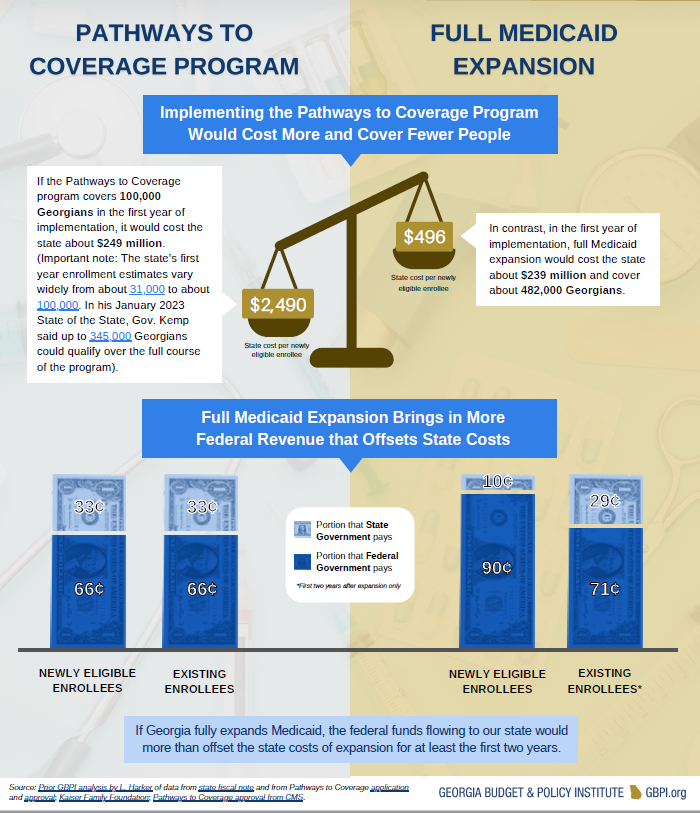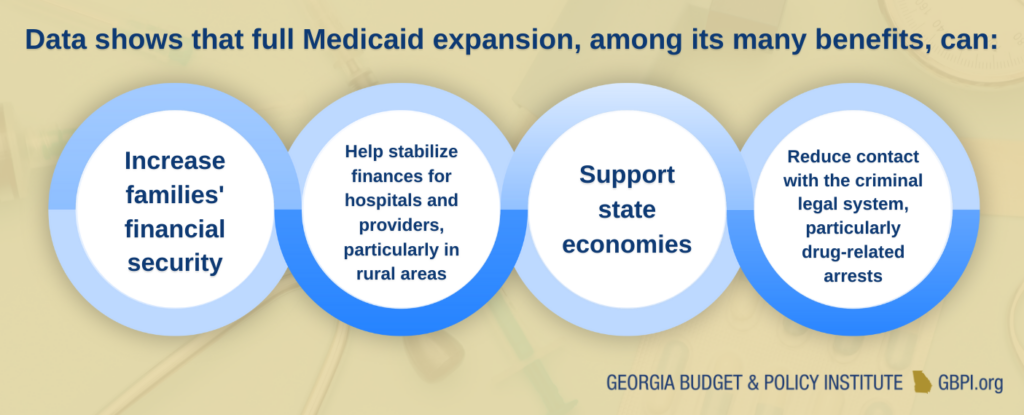Updated February 22, 2023: In the October 2020 Pathways to Coverage approval letter, it was estimated that the program would cover about 31,000 Georgians in the first year and 64,000 Georgians at full enrollment. In December 2022, the Department of Community Health estimated that up to 100,000 Georgians could enroll in the first year, and in his January 2023 State of the State address, Gov. Kemp said up to 345,000 could qualify for the program. An in-depth explanation has not been given for the discrepancy among these estimates. The fact sheet has been updated to reflect the Administration’s newest first-year enrollment estimate.

Source: Prior GBPI analysis by L. Harker of data from state fiscal note and from Pathways to Coverage application and approval; Kaiser Family Foundation; Pathways to Coverage approval from CMS.
Full Medicaid Expansion Would Pay Dividends for Georgians’ Health and Financial Security
Since 2014, hundreds of research studies conducted across states that have fully expanded Medicaid continue to document positive impacts. Full Medicaid expansion increases access to affordable health care coverage for low-income adults. If Georgia fully expanded Medicaid, the largest reductions in uninsurance rates would be among Black Georgians; young Georgians ages 19-34 years old; Georgians who did not complete high school; and in counties in the southern and western parts of the state. This expanded access to affordable health care coverage could also help improve health outcomes and save lives. However, the benefits extend beyond direct effects on health.

The American Rescue Plan offers additional financial incentives for states to fully expand Medicaid for lower-income adults. Specifically, it provides an enhanced federal matching rate on existing Medicaid enrollees for the first two years after full Medicaid expansion. That new incentive is in addition to the 90% federal match for newly eligible enrollees offered under the Affordable Care Act. If Georgia were to fully expand Medicaid, the federal funds flowing to our state, along with increased state and local tax revenues brought by enhanced economic activity, more than offsets the state costs of full Medicaid expansion for at least the first two years. In contrast, the Pathways to Coverage program would partially expand Medicaid for low-income adults and thus would only be eligible for the standard 66% federal matching rate for both newly eligible and existing enrollees. For more background information on each option, please see the Getting the Green Light for Health Care fact sheet or visit Cover Georgia’s website.
Georgians who pay federal income tax are paying to expand access to affordable health care for adults in the 39 states plus the District of Columbia that have adopted full Medicaid expansion. It is past time to bring home those federal funds and all the associated benefits and get Georgians access to the life-saving coverage they deserve.









